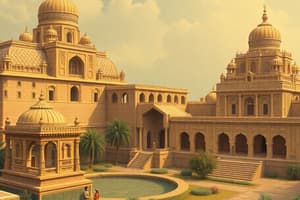Podcast
Questions and Answers
Who is often regarded as the 'father of Indian archaeology'?
Who is often regarded as the 'father of Indian archaeology'?
- Hermann Goetz
- Alexander Cunningham (correct)
- B. B. Lal
- John Marshall
What significant organization was established in 1861 to oversee archaeological research in India?
What significant organization was established in 1861 to oversee archaeological research in India?
- Archaeological Survey of India (correct)
- Indian Heritage Foundation
- Historical Research Society
- Archaeological Society of India
What archaeological technique emerged as a development in modern archaeology?
What archaeological technique emerged as a development in modern archaeology?
- Biogeography
- Stratigraphy
- Dendrochronology
- Radio-carbon dating (correct)
Which era is noted for the introduction of scientific methods in archaeology?
Which era is noted for the introduction of scientific methods in archaeology?
What modern technological advancement is enhancing archaeological site documentation?
What modern technological advancement is enhancing archaeological site documentation?
Flashcards are hidden until you start studying
Study Notes
History of Indian Archaeology
-
Ancient Period
- Archaeological findings from the Indus Valley Civilization (circa 3300-1300 BCE) include well-planned cities like Harappa and Mohenjo-Daro.
- Jain and Buddhist texts mention various sites and relics, highlighting early historical awareness.
-
Colonial Era (19th Century)
- British colonial influence led to systematic archaeological surveys.
- Alexander Cunningham is often regarded as the 'father of Indian archaeology' for his work in the mid-1800s.
- Discovery of significant sites and artifacts, including the Ashoka Pillars and ancient stupas.
-
Early 20th Century
- Introduction of scientific methods in archaeology by figures like John Marshall, who excavated the Indus Valley.
- The establishment of the Archaeological Survey of India (ASI) in 1861 to manage archaeological research and preservation.
- Emergence of Hindu nationalism, influencing the interpretation of historical narratives in archaeology.
-
Post-Independence Period
- Increased emphasis on indigenous archaeological research and cultural heritage preservation.
- Significant discoveries, including the ruins of ancient cities like Taxila in Pakistan and significant Buddhist sites in India.
- Development of new techniques like radio-carbon dating and remote sensing.
-
Modern Archaeology (Late 20th Century to Present)
- Multidisciplinary approaches emerging; collaboration with disciplines like anthropology, geography, and environmental science.
- Focus on community involvement in heritage conservation.
- Continued debates about historical narratives, identity politics, and interpretations of archaeological findings.
-
Current Trends
- Revival of interest in lesser-known sites and local cultural heritage.
- Advances in technology, such as GIS and drones, enhancing site documentation and analysis.
- Increased awareness and debates over archaeological ethics and repatriation of artifacts.
Ancient Period
- The Indus Valley Civilization (3300-1300 BCE) is recognized through well-planned cities like Harappa and Mohenjo-Daro.
- Ancient Jain and Buddhist texts mentioned historical sites and relics, indicating early historical awareness.
Colonial Era (19th Century)
- British colonial influence stimulated systematic archaeological surveys in India.
- Alexander Cunningham is credited as the 'father of Indian archaeology' due to his mid-1800s archaeological work.
- Important discoveries, including the Ashoka Pillars and ancient stupas, were made during this period.
Early 20th Century
- John Marshall introduced scientific methods to archaeology, leading to the excavation of the Indus Valley.
- The Archaeological Survey of India (ASI) was established in 1861 to manage archaeological research and conservation.
- The rise of Hindu nationalism influenced the interpretation of historical narratives in archaeology.
Post-Independence Period
- Increased emphasis was placed on indigenous archaeological research and cultural heritage preservation after India's independence.
- Significant discoveries included ruins of ancient cities like Taxila in Pakistan and Buddhist sites in India.
- New techniques such as radio-carbon dating and remote sensing were developed and used.
Modern Archaeology (Late 20th Century to Present)
- Multidisciplinary approaches in archaeology, combining disciplines like anthropology, geography, and environmental science, emerged during this period.
- Community involvement in heritage conservation gained prominence.
- Continued debates about historical narratives, identity politics, and interpretations of archaeological findings.
Current Trends
- Renewed interest in lesser-known sites and local cultural heritage.
- Advancement in technology, including GIS and drones, has enhanced site documentation and analysis.
- Growing awareness and discussions around archaeological ethics and repatriation of artifacts.
Studying That Suits You
Use AI to generate personalized quizzes and flashcards to suit your learning preferences.




